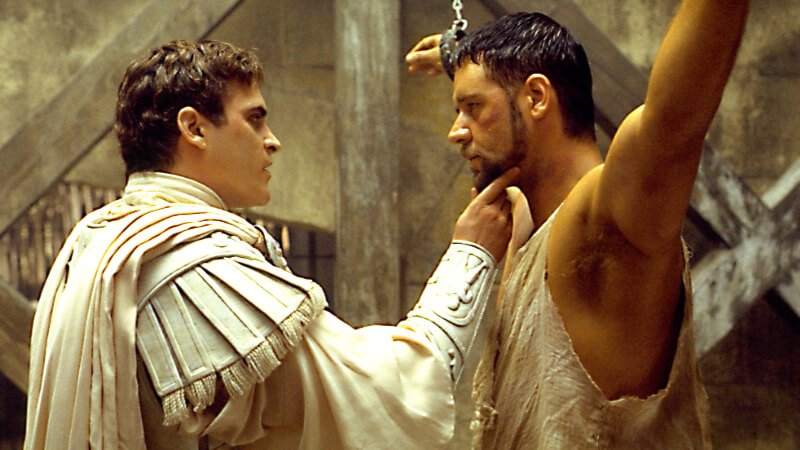
Joaquin Phoenix and Russell Crowe in ‘Gladiator’ (2000)
Synopsis
I’d always wanted to end a team meeting for a project kickoff with Maximus’s command to his troops in that first, thrilling battle scene: “At my signal, unleash hell.” (Alas, the opportunity has passed.) Two decades after first hearing those words, I’m sharing a few musings on this original Gladiator in preparation for taking in Gladiator II.
One can dispose of the plot rather quickly: General Maximus Decimus Meridius (Russell Crowe) is a hero of Rome for having brought much glory home to Rome. In the first few minutes we witness one such victory as his cohort shreds a Germanic tribe. And we learn Maximus himself has a deft hand with a sword. The ailing Emperor Marcus Aurelius (Richard Harris), on hand for the victory, tells Maximus he intends to appoint him as “protector of Rome,” passing over his cowardly and mentally unbalanced son Commodus (Joaquin Phoenix).
Commodus naturally takes this news badly, secretly murdering his father, seizing the title of Caesar, and ordering the execution of Maximus and his family. Commodus returns to Rome, where he indulges in treasury-draining excesses, particularly gladiatorial games in the Colosseum. But who should turn up in the arena? Maximus.
Yes, there’s more to it. But just in case you are one of a handful who haven’t seen it, that’s more than enough.
What distinguishes Gladiator on another viewing? Not that plot or any message. Sure, there is occasional babbling about the value of familial love, about honor, about saving the Rome of AD 180 from despots. But those themes resonate here in the 21st century only with those of us fixated on ancient Rome and its legacy. No, now, a quarter century later, what distinguishes Gladiator is its pageantry. Gladiator is fun to watch. So …
See It
Gladiator mowed down “best picture” awards in 2001 like those Roman archers dispatching the Germanic horde. At the Oscars, it synched five wins out of 12 noms: best picture, actor, costume design, visual effects, and sound. Yet it rarely cracks the top 100 of many prestigious “best film” lists. Why? It is great spectacle. And it is just great spectacle.
Which is good enough. Russell Crowe was in his prime as the strong, honorable general who loses his family to a madman but will set aside his revenge temporarily if it means he can still save Rome. Joaquin Phoenix is just the right amount of creepy as the ambitious but craven Commodus, who has an unsettling attachment to his sister Lucilla (Connie Nielsen) and a sinister focus on her son Lucius (Spencer Treat Clark). In his few scenes, Clark is particularly beguiling as the tow-headed, blue-eyed kid who is awestruck by Maximus. Many movie addicts believe Oliver Reed was the standout supporting actor in his role of the former gladiator-turned-slave-trader, whose sense of honor leads him into one last heroic adventure.
The staging of the gladiatorial battles of yore (circa 2000) seem tame now by more modern standards, almost authentic save for a nail-biting encounter with tigers. Most of the scenes are choreographed well enough for us to follow the action as we root for Maximus and the fellow gladiators who come to respect him and follow his lead.
“Brothers, what we do in life echoes in eternity,” Maximus tells his followers. Gladiator has not had that sort of staying power over the time. But keep that quote in mind should you decide to give Gladiator II a try.